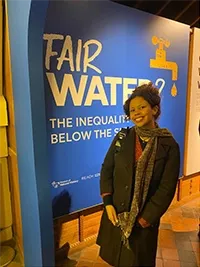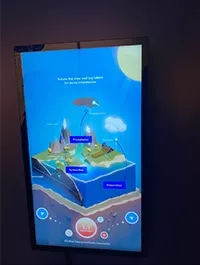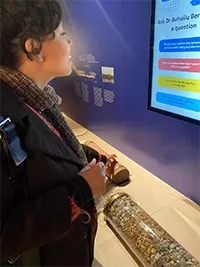Ripples of Change: The Fair Water? Exhibition now open at the University of Oxford Museum of Natural History
At the University of Oxford Museum of Natural History, a groundbreaking exhibition "Fair Water?" has opened its doors, shedding light on water insecurity and working towards equitable water access.
Water is life. It is our most crucial and precious resource on the planet and sustains life in all its forms. While access to clean water might be something that many of us rarely reflect upon, water insecurity remains one of the most pressing challenges across the globe.

Now open at the University of Oxford Museum of Natural History, the Fair Water? exhibition highlights cases of water insecurity and measures towards resilience in Bangladesh, Ethiopia, Kenya, and the UK. The Fair Water? Exhibition is the result of the months-long collaboration between the REACH research group and the Oxford Musuem of Natural History. It brings together groundbreaking research and evocative art installations from practitioners from all over the world. It tells a compelling story of how engineers, policymakers, practitioners, artists, and researchers in vulnerable communities are expanding access to clean, safe, and 'just' water for all.
But what is 'just' water?
- When everyone has enough safe water for their needs.
- When communities and groups have a say in the management of their own water.
- When human water use doesn't harm ecosystems
- When vulnerable communities hold the power of choice in water management systems, inherently improving the quality of life of all.

The exhibition also pays particular attention to the gendered nature of water labor. Women are often relegated to the burden of water-related decisions and tasks - as they collect and carry water, cook, clean, and keep the hygiene of the family. Throughout the exhibition, striking photography from Ethiopian artist Aïda Muluneh brings a sense of lived experience to water stress, showcasing how water access personally impacts women’s lives.
The future of water

In the face of anthropogenic climate change, access to clean and safe water for essential activities is made vulnerable by extreme natural hazards, as well as power dynamics that extract and pollute water from communities that need it. The exhibition includes multiple interactive displays that show how different stages of anthropogenic warming impact water table levels - from varying sea level rise to increased precipitation to groundwater table depletion. These impacts cascade into all areas of life - from food production to transport - stressing the centrality of water in all that we do.
Power dynamics

Through multiple modes of interaction, such as being able to 'ask' questions to experts, the exhibition explores how power dynamics are central to who can access clean and safe water - and what role corporations have in water replenishment and ecosystem restoration. The exhibition debunks popular myths about water use in global supply chains for natural resources, agriculture, and textile goods - and advocates against boycotts of goods from a particular region due to inappropriate water use, as this could have significant knock-on effects for the communities that produce such products. Instead, the exhibition shares a more nuanced perspective on how corporations can change how they engage with the communities and ecosystems in which they produce materials.
Student authors
 Aissa Dearing (they/she) is a previous Environmental Change and Management student from Durham, North Carolina, USA. Her research interests lie at the nexus of political theory, sustainable development, food systems transformation, and greenhouse gas emissions reductions. Aissa has a breadth of multi-sector experience, most notably working in the Biden-Harris White House, philanthropy, Durham-based non-profits, climate journalism, and environmental justice policy development. She will continue her research this year as a DPhil in Geography and the Environment with a Clarendon Scholarship.
Aissa Dearing (they/she) is a previous Environmental Change and Management student from Durham, North Carolina, USA. Her research interests lie at the nexus of political theory, sustainable development, food systems transformation, and greenhouse gas emissions reductions. Aissa has a breadth of multi-sector experience, most notably working in the Biden-Harris White House, philanthropy, Durham-based non-profits, climate journalism, and environmental justice policy development. She will continue her research this year as a DPhil in Geography and the Environment with a Clarendon Scholarship.
 Emma Schneck (she/her) is a student on the MSc Nature, Society and Environmental Governance course and one of the School of Geography and the Environment’s Science Writers. In addition to her coursework, Emma enjoys working as one of the head editors for the Anthroposphere—a multimedia climate magazine based in the University of Oxford. Her main interests include climate justice, climate-induced migration, environmental politics, and small island state representation in the UNFCCC. Her most recent dissertation research explores ocean conservation governance and liminal political movements in Tenerife, Spain.
Emma Schneck (she/her) is a student on the MSc Nature, Society and Environmental Governance course and one of the School of Geography and the Environment’s Science Writers. In addition to her coursework, Emma enjoys working as one of the head editors for the Anthroposphere—a multimedia climate magazine based in the University of Oxford. Her main interests include climate justice, climate-induced migration, environmental politics, and small island state representation in the UNFCCC. Her most recent dissertation research explores ocean conservation governance and liminal political movements in Tenerife, Spain.
Ripples of Change: The Fair Water? Exhibition now open at the University of Oxford Museum of Natural History
At the University of Oxford Museum of Natural History, a groundbreaking exhibition "Fair Water?" has opened its doors, shedding light on water insecurity and working towards equitable water access.





